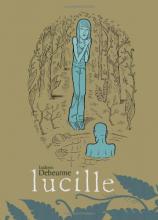Lucille
Review
Lucille
Coming in at just shy of 550 pages, Lucille may surprise readers in that it is the first installment in a multipart, ongoing narrative crafted by Debeurme. The crudeness of the line work betrays the sparse stylings of Chester Brown and perhaps even a slight element of Dan Clowes or Mike Judge, as Debeurme gives his characters and environments very little detail or refinement. As a result, Lucille harkens back to the early alternative cartoons and comics in its visual presentation.
Although Debeurme builds up his characters throughout the book by examining their earlier lives, Lucille opens rather immediately on the teenage life of Lucille, a shy, socially awkward girl who searches for self-definition and explores her sexuality through masturbation. Yet there is very little investment in her character or development of her crisis with anorexia beyond largely superficial and stereotypical teen angst about self-worth and body image. While Debeurme does not make light of these issues, Lucille’s struggles with them feel largely empty and glossed over until much later in the text. Her transformation from a slightly skinny woman into a full-blown, skeletal waifish anorexic is far too rushed and thus limits the power and trauma of the condition.
At first, it appears that Arthur, the lead male character, suffers from the same blanket source material, as he is introduced as the generic misunderstood, troubled youth who dabbles in the "dark arts." Unlike Lucille, however, Arthur is given a much more succinct and well-rounded profile in his alcoholic father, his own battles with Obsessive Compulsive Disorder, and his troubled home life. By far the strongest relationship in the book is not the one that ultimately develops between Arthur and Lucille, but rather the one between Arthur and his own father. It is here that Debeurme makes his greatest emotional statement as well as forges a connection with the reader in the tragic, paternal bonds of Arthur and Vladimir.
There is an inconsistency with the pacing of Lucille due in part to Debeurme's abandonment of panel structure and layout throughout the book. While the gridless approach works in a few sequences—for example, Debeurme achieves a rather seamless transition between the images of young Arthur's chronicle of passing time by counting the number of empty beer glasses atop the bar—the same cannot be said for the high-momentum episodes where action overtakes the narrative and the results are muddled. For example, the fight scene with Vladimir in the bar early in the book or similar aggressive moments later on lose their impact and resonance because of this stylistic approach. Furthermore, the proposed sequences of normalcy such as Arthur watching the X-Files on television seem out of place and awkward in their placement within the evolving and unfolding work.
One of Lucille's most significant attributes, though, is functional, particularly in the translation of the original French-language edition. All too many times, it seems that some highly rated and championed foreign comics lose their stature when translated into English. Whether this is indicative of the profession or simply the inherent details of linguistics is unclear; however, Top Shelf deserves credit here for whatever service it used to produce such a smooth narrative and dialogue-driven prose for American readers.
Furthermore, because Lucille deals with such universal themes facing teens and young adults internationally, it has a great appeal beyond its literary merits for use in the classroom as a text to explore the issues of eating disorders, self-image, mental illness, and familial relationships in a less didactic and authoritative fashion.
Although Lucille can hardly be classified as escapist literature, it succeeds overall in the slower, more intimate, and serene moments, including Lucille's childhood play, Arthur's internal monologues, the initial meetings of the two main characters, and the later episode with Arthur's sailor keychain. Knowing that it is only the first part of a project also makes for a better acceptance of Debeurme's conclusion and the characters’ efforts at redemption and reconciliation. Definitely worth the time and effort, Lucille is a credit to Top Shelf's catalog of impressive graphic novels and deserves the attention of readers wanting some of the most innovative sequential art published today.
Reviewed by Nathan Wilson on July 10, 2012
Lucille
- Publication Date: July 12, 2011
- Genres: Fiction, Graphic Novel
- Paperback: 544 pages
- Publisher: Top Shelf Productions
- ISBN-10: 1603090738
- ISBN-13: 9781603090735



